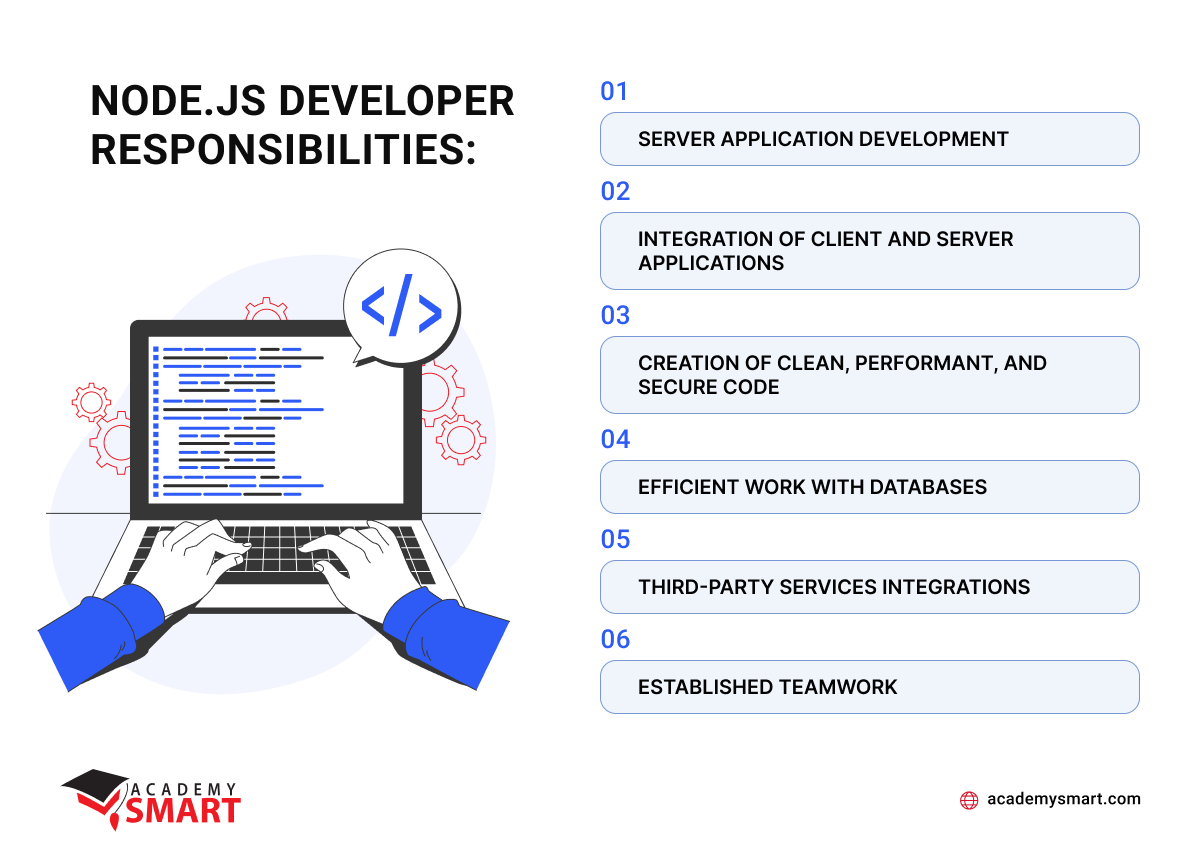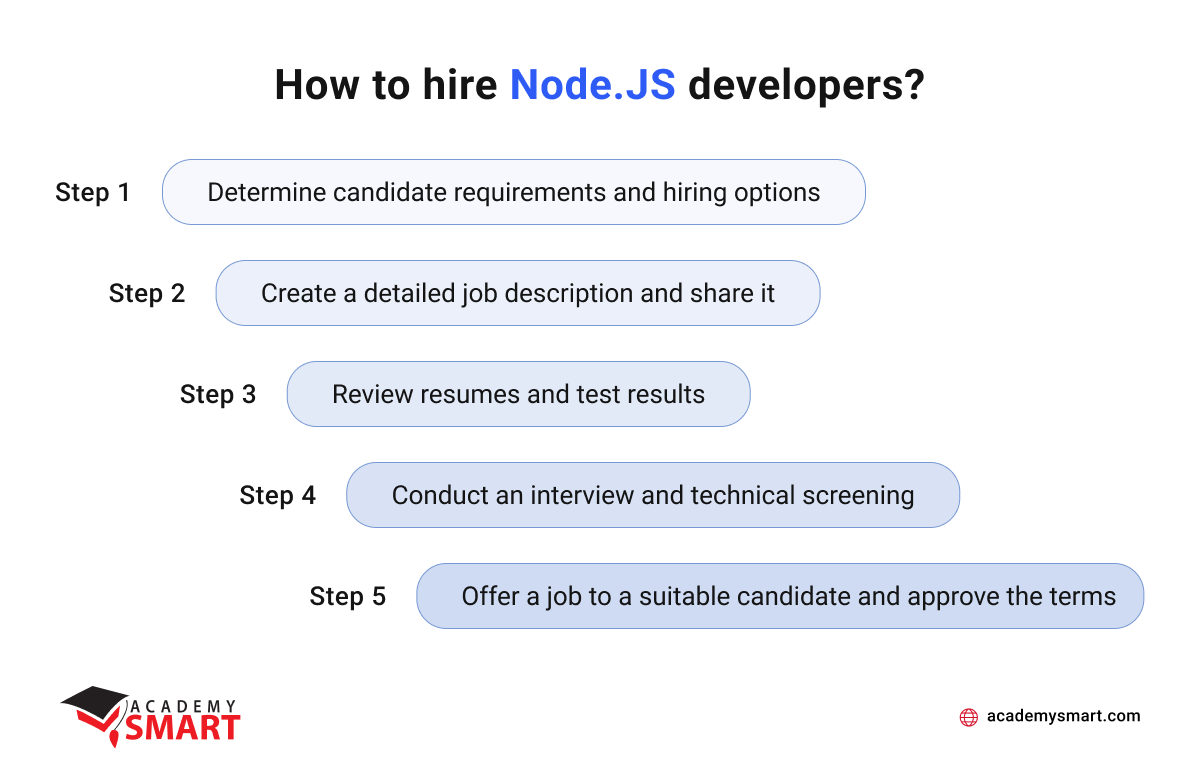
How to hire Node.js Developers: a complete guide
Contents
In today’s software development landscape, Node.js has emerged as a popular and powerful tool for building fast and scalable web applications. You may find this backend framework in various web apps, including streaming services, e-commerce websites, real-time chat platforms, and more. As it continues to gain popularity, hiring skilled and experienced Node.js developers who can effectively utilize this technology to create high-quality software products becomes increasingly important.
Careful selection of the right Node.js coders is critical to ensuring the success of any web application project and can help businesses avoid costly mistakes and deliver exceptional user experiences. This short but informative guide aims to answer the questions of what an excellent Node programmer needs to be able to do and where to find him best.
What is a Node.js Developer
A Node.js developer is a software engineer specializing in programming scalable and high-performance applications using a popular open-source runtime environment. They possess a deep understanding of JavaScript and other web technologies, such as HTML and CSS. They are skilled in building server-side applications, RESTful APIs, and real-time applications. Node.js developers are also well-versed in using various frameworks, libraries, and tools, such as Express, Socket.io, and npm, to streamline coding and increase productivity.
What makes Node.js to be so attractive for back-end developers?
- Speed and scalability
Node.js is built on the Google V8 engine, which compiles JavaScript code into native machine code, making it extremely fast and efficient. It also has an event-driven, non-blocking I/O model that allows it to handle many connections and requests with low overhead. It also contributes to the SEO optimization of web applications, which creates an essential competitive advantage in promoting software products online. - Flexibility
Node.js is highly flexible and can be used for various applications, from simple APIs to complex web applications and real-time systems. It also supports protocols and formats like HTTP, WebSocket, JSON, and XML. - NPM ecosystem
Node.js comes with a powerful package manager called NPM (Node Package Manager), which provides access to a vast repository of open-source libraries and tools that can be easily integrated into your projects. - Full-stack development
Node.js allows developers to use JavaScript for both front-end and back-end development, which makes it easier to build full-stack applications and reduces the need for context-switching between different languages and frameworks. - Large and active community
Node.js use many developers, so many resources are available for learning, support, and collaboration.
What does a Node.js Developer do
Node.js devs usually create, test, and maintain back-end applications using framework Node. This specialty includes working with databases and third-party APIs, and JavaScript coding.
Depending on their skill level, Node.js developers may also be responsible for the following:
- At the Junior level, they are primarily focused on writing code, debugging and testing applications, and working under the guidance of senior developers.
- At the Middle level, they are responsible for the architecture and design of the application, collaborating with other developers, and ensuring the application meets performance and security standards.
- At the Senior level, they keep the leadership of a team of developers, overseeing the development process and making strategic decisions about the architecture and design of the application. They may also be responsible for mentoring junior and mid-level developers.
So, what does the Node.js developer do daily?
Server application development
Node.js programmers are responsible for building scalable and robust backend applications that can handle high volumes of traffic and data processing to meet the needs of modern businesses. They must utilize their expertise in JavaScript to create and test efficient and optimized apps using various web frameworks, databases, and other technologies commonly used in server-side development. They work closely with other developers and stakeholders to ensure that the applications they create are secure, reliable, and performant.
Integration of client and server applications
Integration of client and server apps is another crucial task of Node coders. They must ensure seamless communication between an application’s front-end and back-end systems and implement efficient data transfer and storage methods. They must also provide the application is scalable and secure enough to handle large traffic volumes.
Node.js developers use various frameworks and libraries such as Express, Socket.IO, and Mongoose to integrate the different parts of an application and provide a smooth user experience.
Creation of clean, performant, and secure code
Writing clean, efficient, and secure code is a primary duty of any Node.js developer. That means ensuring the code is easy to read, maintain, and optimized for performance and scalability. JS-programmers must also be vigilant about potential security vulnerabilities and implement preventive measures, such as input validation and encryption. Writing clear and comprehensive documentation is also essential to creating transparent and usable software code.
Efficient work with databases
This responsibility includes selecting appropriate database technologies, designing efficient database schemas, optimizing database queries, and ensuring data security and integrity. A Node developer must also be proficient in working with popular databases such as MySQL, MongoDB, and PostgreSQL. Additionally, they must be familiar with Object-Relational Mapping (ORM) tools and be able to write efficient database access code to ensure fast application performance.
Third-party services integrations
Effective third-party services integration is crucial for the success of all modern web applications, as it enables them to leverage the capabilities of other services and platforms to deliver a better user experience. As part of their job, Node.js programmers need to integrate various third-party services into their applications, such as payment gateways, email services, social media platforms, and more. It involves understanding the APIs of these services, integrating them into the application’s codebase, and ensuring that the implementation is secure and performant. Node.js devs may also need to troubleshoot and resolve any issues that arise from these integrations.
Established teamwork
Node.js coders always collaborate with other developers, project managers, and stakeholders. They should be able to communicate effectively, understand and meet project requirements, and be open to feedback and suggestions from other team members. Working in a team requires good interpersonal skills, flexibility, and the ability to adapt to changing project requirements and priorities. A developer should be able to contribute to the team’s success by sharing their knowledge, expertise, and experience and by actively participating in project discussions and decision-making processes.
In addition to strong skills in Node.js development, complementary expertise that would be advantageous for Node.js developers include familiarity with front-end development technologies such as HTML, CSS, and JavaScript frameworks like React or Angular, as well as experience with containerization technologies like Docker and knowledge of cloud platforms like AWS or Google Cloud. Mastery with testing frameworks and methodologies and experience with agile development practices would also be beneficial.

Node.js developer responsibilities
Why do you need to hire Node.js Developers
Node.js is a versatile and flexible platform that can be helpful in various spheres of software development. Here are some examples of areas where Node.js is commonly used to demonstrate why you have to hire such developers for your project:
- Web development
Node is commonly used for developing scalable, high-performance web applications. It provides several modules and libraries that simplify web development and enhance developer productivity. - Real-time applications
Node.js is a popular choice for building real-time applications like chat applications, online gaming platforms, and collaboration tools. - Internet of Things (IoT)
Node can be used to build IoT applications as it provides easy access to hardware and sensors, making it easier to manage and analyze data. - Data streaming
Node.js suits data-intensive applications like real-time data streaming and processing. - API development
Node provides a powerful and scalable framework for building APIs that can be easily integrated with other applications.
Overall, Node.js is a popular choice for developers due to its simplicity and high functionality. Our blog earlier guided how to hire suitable developers for modern software development in Node.
Choosing Node.JS for the technology stack of your web app is a perfect idea. Many major companies, like Netflix, LinkedIn, Uber, PayPal, Walmart, NASA, Mozilla, Trello, etc, appreciated the platform’s high performance and efficiency in developing server applications. Below are some examples of Node.js backend development by Academy Smart’s team.
How to find a Node.js Developer
Node.js has become a top backend web development technology, so there is a growing demand for skilled Node.js devs. Fortunately, several ways exist to find the right programmer for your project. Whether you’re looking to hire a freelancer, outsource your project to a development agency, or build an in-house team of Node.js developers, plenty of options are available to help you find the expertise you need.
Freelance
Hiring a freelance Node.js developer has several undeniable advantages. Freelancers can often work on a project-by-project basis, which can be cost-effective for smaller projects. They are also often highly skilled and specialized, with expertise in specific areas of Node.js development. Additionally, freelancers may be more flexible with their work schedule and can often work remotely, which can be convenient for both the developer and the employer. However, the lack of communication, the inability to fully assess a programmer’s qualifications, and problems with his self-organization can significantly disrupt the deadlines for submitting a task.
Finding a freelance Node.js developer can be done in several ways. One way is to utilize freelance platforms like Upwork, Freelancer, and Fiverr, which have many Node.js programmers available. Another option is to join online communities such as LinkedIn or Reddit groups, and GitHub to connect with Node.js developers. Referrals from friends, colleagues, or other developers can also be an effective way to find reliable freelance executants. Lastly, job boards like Indeed, Glassdoor, and SimplyHired often have listings for freelance Node.js coders.
Outsourcing
Outsourcing IT companies have teams of experienced Node.js developers who can handle your project from start to finish. They often have a proven track record and can provide references and case studies to demonstrate their expertise. You can also consider networking with professionals in the industry, attending conferences and meetups, and joining online communities of Node programmers.
When looking for outsourcing Node.js developers, it is crucial to consider factors such as their experience with similar projects, communication skills, and ability to work within your budget and timeline. It is also beneficial to better review their portfolio and client testimonials to understand their work style and approach to development.
In addition, when choosing an outsourced software development service provider, you are not limited by the localization of the programming team. It opens up great opportunities for more flexible budget management since the cost of doing work differs significantly for native developers and coders from remote countries. One of the popular offshore IT countries is traditionally considered Ukraine, which you can read in detail in the article “How to hire software developers in Ukraine in 2023 and why it is still beneficial?“.
Outstaffing
Outstaffing Node.js programmers can be found in several ways. One way is to work with a staffing agency specializing in IT recruitment. These companies usually have a pool of qualified candidates who can match your project requirements. They take care of the administrative tasks, such as payroll, taxes, and benefits, while you manage the project and communicate directly with the developers.
Another way to find outstaffing Node.js developers is to look for outsourcing companies that offer outstaffing services. They have different kinds of programmers and can provide a dedicated team or single persons working exclusively on your project. This approach gives you more control over the development process, as you can communicate directly with the team and manage the project according to your needs.
Academy Smart combines the advantages of both approaches as an IT company with staff augmentation services. You may look at the certification application our Node.js developers have worked on as an example of our expertise.

Certification application created on the base of Node.js
How to hire Node.js Developers
Recruiting Node.js devs can be challenging, especially for those unfamiliar with the role’s technical aspects. However, the process can be streamlined and successful with the proper guidance and knowledge. In the following, we will cover the stages involved in hiring a Node.js developer you have to pass till offering a job to a suitable candidate. By following them, you can get a qualified and experienced programmer who will contribute to the success of your project.
1. Determine candidate requirements and hiring options
In the first step, defining the candidate’s qualifications, experience, and skill set necessary for the project is crucial. The specific requirements differ based on the project’s complexity and scope. For instance, a task requiring real-time processing may need developers with particular skills in server-side rendering, real-time web sockets, and database management. In another case, mastery of cloud computing services like AWS Amazon, or DevOps skills may be required too, etc.
Once the job requirements are defined, various hiring options are available to find the right candidate. You can look for freelancers, outsource a development or find developers through outstaffing. Each option has benefits and drawbacks that have to be assessed depending on the project’s needs and budget.
2. Create a detailed job description and share it
A well-written job description is essential in attracting suitable candidates and conveying your expectations. It should include the job title, a brief company overview, a summary of the job responsibilities, required skills and qualifications, and other essential details about the position, such as the location, salary range, and work schedule.
The job title should accurately articulate the responsibilities of the programmer, such as “Full Stack Node.js Developer” or “Backend Node.js Developer.” The required qualifications outline the technical and non-technical skills necessary for the role in the team.
Once the job description is complete, it should be shared through various channels, such as job boards, social media, professional networks, or recruiting services, to attract a pool of qualified candidates.
3. Review resumes and test results
This stage involves evaluating resumes to determine if candidates meet the requirements listed in the job description, such as experience with Node.js, proficiency in specific programming languages, and familiarity with certain tools or frameworks.
In addition to resumes, preliminary test tasks can provide insight into a candidate’s skills and abilities. The review process helps to identify the most preferred candidates for further consideration.
4. Conduct an interview and technical screening
This step allows the employer to assess the candidate’s technical skills, experience, and problem-solving abilities more in-depth and personally.
During the interview, the employer can ask questions about the candidate’s previous work experience, technical expertise, and understanding of Node.js and assess his communication and teamwork skills.
Technical screening can include a coding challenge or a test project to evaluate the candidate’s practical skills and problem-solving abilities. The results of this stage can help the employer determine if the candidate is a good fit for the job and the company culture.
5. Offer a job to a suitable candidate and approve the terms
The last step is to offer the job to the most suitable applicant and agree on the terms. That includes negotiating the salary, benefits, work schedule, and other details related to the job.
Once the candidate has accepted the job offer, it’s crucial to provide them with the necessary paperwork, such as an employment contract, and ensure they have all the required resources to begin working.
Additionally, it’s important to communicate with the new hire during their onboarding process and provide support as needed.

5-step guide to hiring Node.js developers
Reasons to hire Node.js Developers through Academy SMART
Academy Smart is a well-established IT agency based in Ukraine with over 13 years of experience in custom web application development and providing outstaffing services. Our team offers to create high-quality software solutions at competitive offshore prices.
Here are some reasons why partnering with Academy Smart can be beneficial for your enterprise:
- We have a team of qualified developers with strong communication skills and expertise in various technologies and industries that follow an agile development methodology.
- We build customized applications that cater to our client’s unique business needs.
- We have a rigorous quality assurance process to ensure the software we develop meets performance and safety requirements.
- Our offshore location allows us to offer competitive pricing without sacrificing quality.
- We provide complete transparency in our development process and project management, keeping our clients informed every step of the way.
Do you need an efficient backend solution? Partnering with Academy Smart can be an excellent choice for businesses looking for responsibility, reliability, and skill. Contact us to get specialists ready to code it creatively and competently.
Hire Node.js Developer: Frequently Asked Questions
How much does it cost to hire a Node.js Developer?
The cost of a Node.js development service can vary depending on factors such as devs’ experience level, location, and the nature of the project. Generally, freelance Node coders may charge anywhere from $30-$150 per hour, while hiring an outstaffing developer at Academy Smart can range from 35-60 euros per hour.
How can I hire the best Node.js Developer?
To recruit the best Node.js programmer, you should define your requirements, thoroughly evaluate candidates’ technical skills and experience, and assess their teamwork and communication abilities. Consider working with a reputable hiring IT agency or platform to help you find and screen top talent.
Book a free consultation

Reach out to start talking today!











